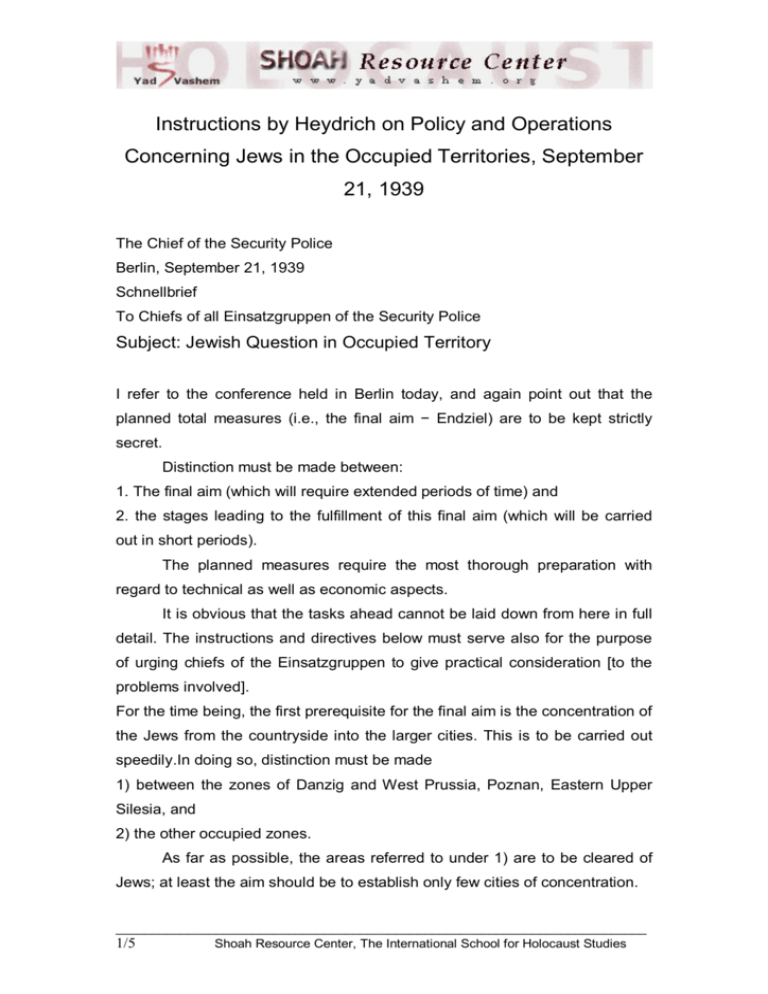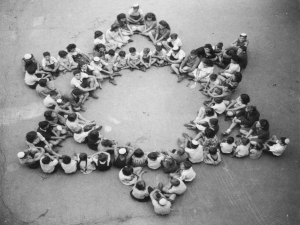Instructions by Heydrich on Policy and Operations Concerning Jews
advertisement

Instructions by Heydrich on Policy and Operations Concerning Jews in the Occupied Territories, September 21, 1939 The Chief of the Security Police Berlin, September 21, 1939 Schnellbrief To Chiefs of all Einsatzgruppen of the Security Police Subject: Jewish Question in Occupied Territory I refer to the conference held in Berlin today, and again point out that the planned total measures (i.e., the final aim − Endziel) are to be kept strictly secret. Distinction must be made between: 1. The final aim (which will require extended periods of time) and 2. the stages leading to the fulfillment of this final aim (which will be carried out in short periods). The planned measures require the most thorough preparation with regard to technical as well as economic aspects. It is obvious that the tasks ahead cannot be laid down from here in full detail. The instructions and directives below must serve also for the purpose of urging chiefs of the Einsatzgruppen to give practical consideration [to the problems involved]. For the time being, the first prerequisite for the final aim is the concentration of the Jews from the countryside into the larger cities. This is to be carried out speedily.In doing so, distinction must be made 1) between the zones of Danzig and West Prussia, Poznan, Eastern Upper Silesia, and 2) the other occupied zones. As far as possible, the areas referred to under 1) are to be cleared of Jews; at least the aim should be to establish only few cities of concentration. __________________________________________________________________________ Shoah Resource Center, The International School for Holocaust Studies 1/5 In the areas under 2), as few concentration centers as possible are to be set up, so as to facilitate subsequent measures. In this connection it should be borne in mind that only cities which are rail junctions, or are at least located on railroad lines, should be selected as concentration points. On principle, Jewish communities of less than 500 persons are to be dissolved and transferred to the nearest concentration center. This decree does not apply to the area of Einsatzgruppe 1, which is situated east of Cracow and is bounded roughly by Polanice, Jaroslaw, the new line of demarcation, and the former Slovak-Polish border. Within this area only an approximate census of Jews is to be carried out. Furthermore, Councils of Jewish Elders (Juedische AEltestenraete), as outlined below, are to be set up. II. Councils of Jewish Elders 1) In each Jewish community a Council of Jewish Elders is to be set up which, as far as possible, is to be composed of the remaining authoritative personalities and rabbis. The Council is to be composed of up to 24 male Jews (depending on the size of the Jewish community). The Council is to be made fully responsible, in the literal sense of the word, for the exact and prompt implementation of directives already issued or to be issued in the future. 2) In case of sabotage of such instructions, the Councils are to be warned that the most severe measures will be taken. 3) The Judenraete (Jewish Councils) are to carry out an approximate census of the Jews of their areas, broken down if possible according to sex (and age groups): a) up to 16 years, b) from 16-20 years, and c) above; and also according to the principal occupations. The results are to be reported in the shortest possible time. 4) The Councils of Elders are to be informed of the date and time of the evacuation, the means available for evacuation, and, finally, the departure routes. They are then to be made personally responsible for the evacuation of the Jews from the countryside. The reason to be given for the concentration of the Jews in the cities is that the Jews have taken a decisive part in sniper attacks and plundering. __________________________________________________________________________ Shoah Resource Center, The International School for Holocaust Studies 2/5 5) The Councils of Elders in the concentration centers are to be made responsible for the appropriate housing of the Jews arriving from the countryside. For reasons of general police security, the concentration of the Jews in the cities will probably call for regulations in these cities which will forbid their entry to certain quarters completely and that − but with due regard to economic requirements − they may, for instance, not leave the ghetto, nor leave their homes after a certain hour in the evening, etc. 6) The Councils of Elders are also to be made responsible for the suitable provisioning of the Jews during the transport to the cities. There is no objection to the evacuated Jews taking with them their movable possessions insofar as that is technically possible. 7) Jews who fail to comply with the order to move into cities are to be given a short additional period of grace where there was sufficient reason for the delay. They are to be warned of the most severe penalties if they fail to move by the later date set. III. All necessary measures are, on principle, always to be taken in closest consultation and cooperation with the German civil administration and the competent local military authorities. In the execution [of this plan], it must be taken into consideration that economic requirements in the occupied areas do not suffer. 1) Above all, the needs of the army must be taken into consideration. For instance, for the time being, it will scarcely be possible to avoid, here and there, leaving behind some trade Jews who are absolutely essential for the provisioning of the troops, for lack of other possibilities. But in such cases the prompt Aryanization of these enterprises is to be planned and the move of the Jews to be completed in due course, in cooperation with the competent local German administrative authorities. 2) For the preservation of German economic interests in the occupied territories, it is obvious that Jewish-owned war and other essential industries, and also enterprises, industries and factories important to the Four-Year Plan, must be maintained for the time being. __________________________________________________________________________ Shoah Resource Center, The International School for Holocaust Studies 3/5 In these cases also, prompt Aryanization must be aimed at, and the move of the Jews completed later. 3) Finally, the food situation in the occupied territories must be taken into consideration. For instance, as far as possible, land owned by Jewish settlers is to be handed over to the care of neighboring German or even Polish farmers to work on commission to ensure the harvesting of crops still standing in the fields, and replanting. With regard to this important question, contact is to be made with the agricultural expert of the Chief of the Civil Administration. 4) In all cases in which it is not possible to coordinate the interests of the Security Police on the one hand, and the German civil administration on the other, I am to be informed by the fastest route and my decision awaited before the particular measures in question are carried out. IV. The Chiefs of the Einsatzgruppen are to report to me continuously on the following matters: 1) Numerical survey of the Jews present in their areas (according to the above classifications, if possible). The numbers of Jews evacuated from the countryside and of those already in the cities is to be listed separately. 2) Names of the cities which have been designated as concentration centers. 3) The dates set for the Jews to move to the cities. 4) Surveys of all the Jewish [owned] war and other essential industries and enterprises, or those important to the Four-Year Plan in their areas. If possible, the following should be specified: a) Type of enterprise (with a statement on possible conversion to really vital or war-important enterprises or ones of importance to the Four-Year Plan); b) Which factories should be most urgently Aryanized (in order to forestall possible losses); What kind of Aryanization is proposed? Germans or Poles? (the decision to depend on the importance of the enterprise); c) The number of Jews working in these factories (specify those in leading positions). __________________________________________________________________________ Shoah Resource Center, The International School for Holocaust Studies 4/5 Can operations at the enterprise be continued without difficulty after the removal of the Jews, or will it be necessary to allocate German or possibly Polish workers in their place? In what numbers? If Polish workers have to be used care should be taken that they are drawn mainly from the former German provinces so as to begin to ease the problem there. These matters can be carried out only by means of coordination with the Labor Offices which have been set up. V. In order to reach the planned aims, I expect the fullest cooperation of the whole manpower of the Security Policy and the SD. The Chiefs of neighboring Einsatzgruppen are to establish contact with each other immediately in order to cover the areas in question completely. VI. The High Command of the Army; the Plenipotentiary for the Four-Year Plan (attention: Secretary of State Neumann), the Reich Ministry for the Interior (attention: State Secretary Stuckart), for Food and the Economy (attention: State Secretary Landfried), as well as the Chiefs of Civil Administration of the Occupied Territories have received copies of this decree. signed Heydrich PS-3363. Source: Documents on the Holocaust, Selected Sources on the Destruction of the Jews of Germany and Austria, Poland and the Soviet Union, Yad Vashem, Jerusalem, 1981, Document no. 73 __________________________________________________________________________ Shoah Resource Center, The International School for Holocaust Studies 5/5







